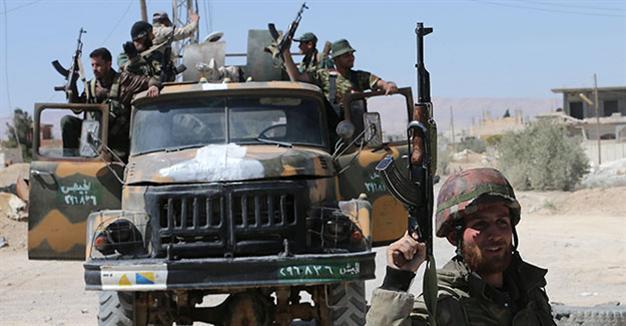Syrian regime, backed by Russia, set for new Aleppo attack
BEIRUT/MOSCOW

Syrian soldiers patrol on April 4, 2016 in the devastated town of al-Qaryatain, in the province of Homs in central Syria, after Syrian troops regained control of the town from ISIL the previous day - AFP photo
The Russian air force and Syrian military are preparing a joint operation to take Aleppo from rebels, the Syrian prime minister was quoted saying on April 10, and an opposition official said a cease-fire was on the verge of collapse.
With a U.N. envoy due in Damascus in a bid to advance struggling diplomatic efforts, the “cessation of hostilities agreement” brokered by Russia and the United States came under new strain as government and rebel forces fought near Aleppo.
The cease-fire came into effect in February with the aim of paving the way for a resumption of talks to end the five-year-long war. But it has been widely violated, with each side blaming the other for breaches. The fighting south of Aleppo marks the most significant challenge yet to the deal.
Diplomacy has meanwhile made little progress with no compromise over the future of President Bashar al-Assad, his position strengthened by Iranian and Russian military support.
A top Iranian official, in comments to Iran TV, rejected what he described as a U.S. request for Tehran’s help to make Assad leave power, saying he should serve out his term and be allowed to run in a presidential election “as any Syrian.”
Syrian Prime Minister Wael al-Halaki told a delegation of visiting Russian lawmakers of preparations to “liberate” Aleppo, Syria’s biggest city and commercial hub before the conflict that erupted in 2011. Aleppo is divided into areas controlled separately by the government and opposition.
“We, together with our Russian partners, are preparing for an operation to liberate Aleppo and to block all illegal armed groups which have not joined or have broken the cease-fire deal,” he was quoted as saying by TASS news agency.
Dmitry Sablin, a member of Russia’s upper house of parliament and a member of the delegation, told RIA news agency “Russian aviation will help the Syrian army’s ground offensive operation.”
The deployment of the Russian air force to Syria last year helped tip the war Assad’s way as it bombed rebels. President Vladimir Putin last month withdrew some of the Russian forces, but maintained an air base in Latakia, and kept up strikes on the Islamic State of Iraq and the Levant (ISIL).
Neither the al-Qaeda-linked al-Nusra Front or ISIL are included in the partial cease-fire.
Rebels have reported the resumption of Russian air strikes south of Aleppo, an important theatre where Iranian forces and Lebanon’s Hezbollah are fighting in support of the army and the Nusra Front is deployed in close proximity to rebels.
The Syrian Observatory for Human Rights said a total of 35 combatants had been killed on both sides in a 24 hour period in the area, where fighting has been raging for some 10 days.
A member of the main opposition council said the last 10 days had “witnessed a serious deterioration, to the point where the ceasefire is about to collapse.” Bassma Kodmani of the High Negotiations Committee also told Journal du Dimanche that a U.S.-Russian cease-fire monitoring mission was “powerless.”
The war has killed more than 250,000 people, created the world’s worst refugee crisis, and allowed for the rise of ISIL.
Rami Abdulrahman, director of the Syrian Observatory for Human Rights, said “in Aleppo there is a real collapse of the truce.”
The army says groups that had agreed to the cessation of hostilities had taken part in al-Nusra Front attacks on government-held positions south of Aleppo. Free Syrian Army (FSA) groups meanwhile blame the fighting on government violations.
“The air strikes are now roughly back to what they were,” said Mohamed Rasheed, head of the media office with the Jaysh al-Nasr rebel group. A Syrian military source said: “The battles are raging because ... armed groups that were part of the (truce) joined Nusra in the attack.”
The Observatory also reported fighting on Sunday between government and rebel forces near the opposition-held town of Douma outside Damascus, and said government helicopters had dropped barrel bombs on rebel-held areas north of Homs.
Barrel bombs are oil drums filled with explosives. While the government denies dropping them, their use has been widely recorded, including by a U.N. Commission of Inquiry on Syria.
